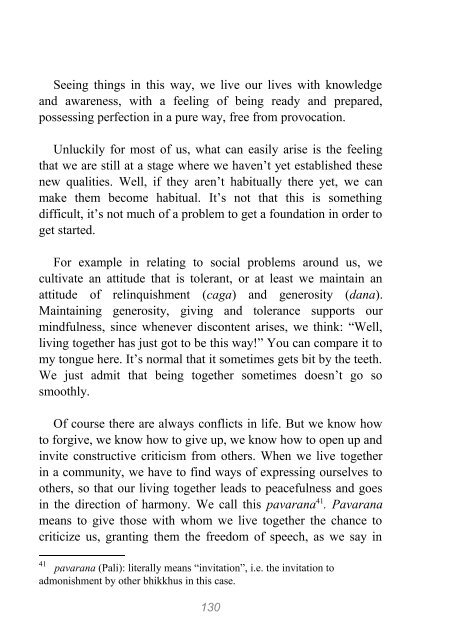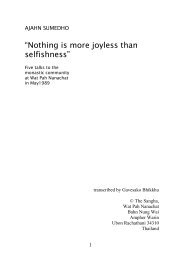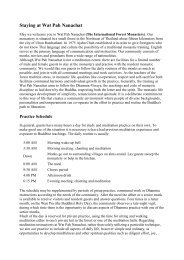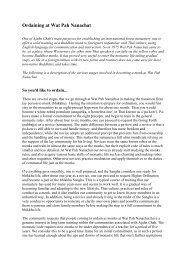Luang Por Liem: The Ways of the Peaceful - Wat Pah Nanachat
Luang Por Liem: The Ways of the Peaceful - Wat Pah Nanachat
Luang Por Liem: The Ways of the Peaceful - Wat Pah Nanachat
You also want an ePaper? Increase the reach of your titles
YUMPU automatically turns print PDFs into web optimized ePapers that Google loves.
Seeing things in this way, we live our lives with knowledge<br />
and awareness, with a feeling <strong>of</strong> being ready and prepared,<br />
possessing perfection in a pure way, free from provocation.<br />
Unluckily for most <strong>of</strong> us, what can easily arise is <strong>the</strong> feeling<br />
that we are still at a stage where we haven’t yet established <strong>the</strong>se<br />
new qualities. Well, if <strong>the</strong>y aren’t habitually <strong>the</strong>re yet, we can<br />
make <strong>the</strong>m become habitual. It’s not that this is something<br />
difficult, it’s not much <strong>of</strong> a problem to get a foundation in order to<br />
get started.<br />
For example in relating to social problems around us, we<br />
cultivate an attitude that is tolerant, or at least we maintain an<br />
attitude <strong>of</strong> relinquishment (caga) and generosity (dana).<br />
Maintaining generosity, giving and tolerance supports our<br />
mindfulness, since whenever discontent arises, we think: “Well,<br />
living toge<strong>the</strong>r has just got to be this way!” You can compare it to<br />
my tongue here. It’s normal that it sometimes gets bit by <strong>the</strong> teeth.<br />
We just admit that being toge<strong>the</strong>r sometimes doesn’t go so<br />
smoothly.<br />
Of course <strong>the</strong>re are always conflicts in life. But we know how<br />
to forgive, we know how to give up, we know how to open up and<br />
invite constructive criticism from o<strong>the</strong>rs. When we live toge<strong>the</strong>r<br />
in a community, we have to find ways <strong>of</strong> expressing ourselves to<br />
o<strong>the</strong>rs, so that our living toge<strong>the</strong>r leads to peacefulness and goes<br />
in <strong>the</strong> direction <strong>of</strong> harmony. We call this pavarana 41 . Pavarana<br />
means to give those with whom we live toge<strong>the</strong>r <strong>the</strong> chance to<br />
criticize us, granting <strong>the</strong>m <strong>the</strong> freedom <strong>of</strong> speech, as we say in<br />
41 pavarana (Pali): literally means “invitation”, i.e. <strong>the</strong> invitation to<br />
admonishment by o<strong>the</strong>r bhikkhus in this case.<br />
130









